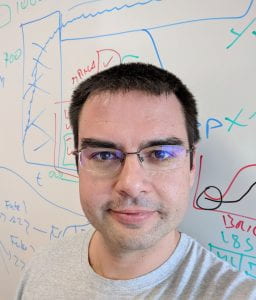Meet Dr Jordi Paps Montserrat, lecturer in Bioinformatics in the Faculty of Life Sciences.
Tell us about your journey into academia…
The X-Men made me do it! I am interested in how changes in the genetic makeup of organisms have driven the evolution of life. I was a nerd before being a nerd was cool. When I was a kid, I loved reading comic books and sci-fi novels. Well, I still very much do so! They were a fantastic first contact with science and how it provides some answers to life, the universe, and everything. Plus, mutants have very cool powers.
I went to university to study Biology, with a focus on molecular biology. During my degree, I discovered a previously unknown fascination for genetics and evolution, and I wanted to learn more. This led me to do a PhD degree on this topic (Barcelona), in which I also found out how much I enjoy teaching. After my PhD, I embarked on a couple of post-doctoral positions (Oxford). In 2015 I got my first lecturer position in Essex, and in 2019 I moved to Bristol. I love Bristol, the University is an amazing intellectual environment and the city culture is lively. In many ways it reminds me of my hometown, Barcelona, and I feel at home here.
What’s your favourite thing about teaching on postgraduate taught programmes at Bristol?
Teaching is one of the most rewarding activities as an academic. I am thrilled to see the impact the MSc in Bioinformatics is going to have on our students. I think research-led master’s programmes like ours provide skills to our students, allowing them to face modern problems in a way they couldn’t before.
During the last 20 years, all the life sciences have lived a major revolution, a true paradigm shift. Now we have access to humongous amounts of data, in many different fields, from genomics to biochemistry, to ecology or behaviour. And this data has changed how we see and understand the world, but also required new approaches to cope with it. This explosion of data is also impacting the public sector, with projects like Genomics England (sequencing the genome of 100,000 humans), and private companies (think of “23 and me” or “Ancestry.com”).
Many employers seek to recruit intelligent graduate students that have advanced IT skills. Our students will work with world-leading researchers and leave the programme equipped with the critical thinking and skills required to work on any of these areas, from research to private businesses.
What’s your number one top tip for prospective postgraduate students?
Stay curious! In this master’s you will do science, and there is no more important quality for scientists. If you are curious about nature, you will be interested in one or more questions, and this interest will lead you to want to learn more and work hard on these problems.
Also, if you love life sciences but are concerned about things like programming, don’t fret! This is a programme designed and taught by scientists for scientists. We are not computer engineers (well, there is one!), we are scientists that have learnt a few computer tricks to tackle biological questions. This programme does not assume you have any previous knowledge of programming, and will teach you from scratch.


